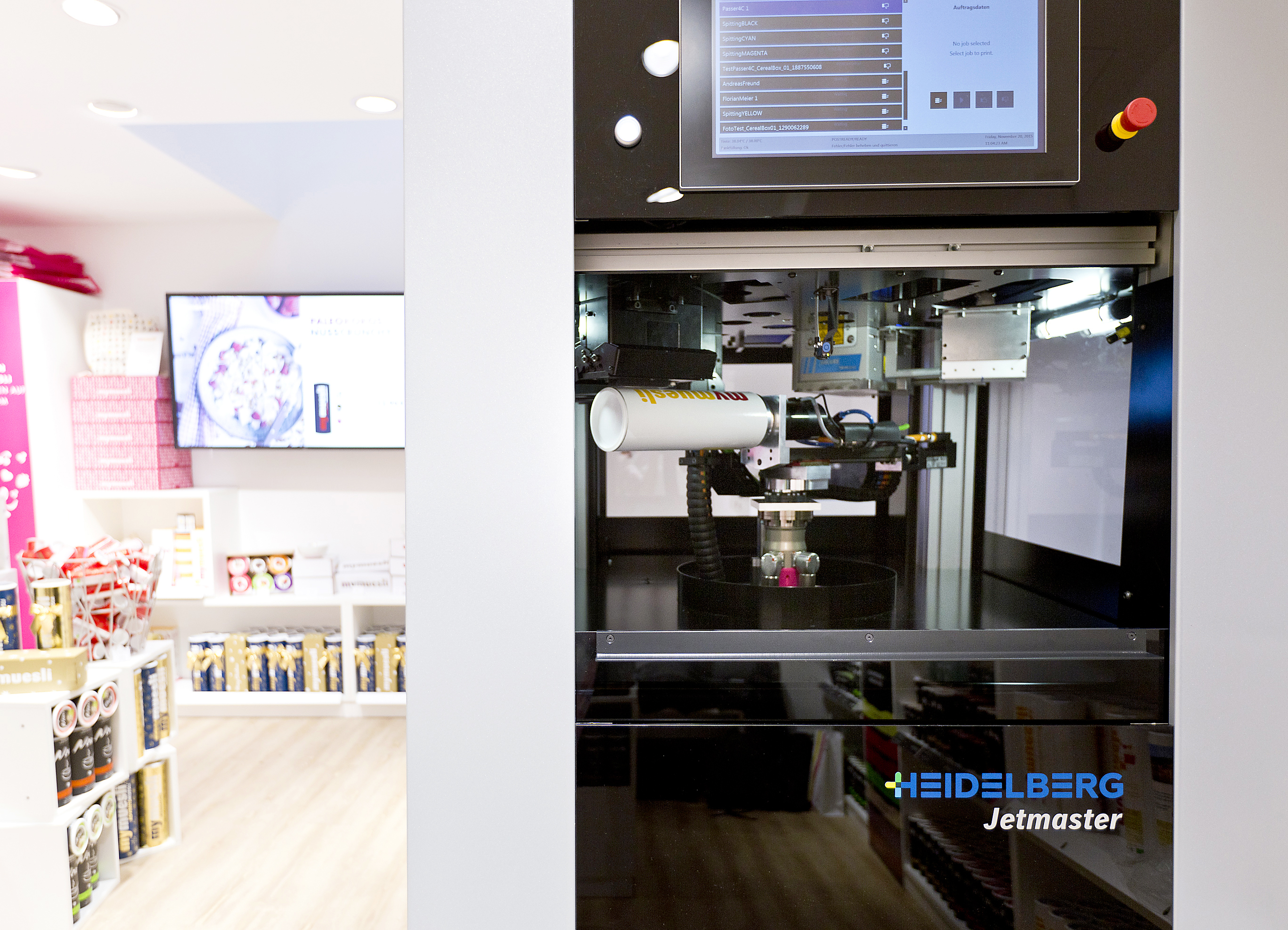A German firm makes digital printing faster and more efficient -and muesli more personal
The mymuesli shop on Heidelberg’s quaint Hauptstrasse stands on the edge of the city’s historic old town and just across the Neckar River from Germany’s oldest university. But it’s at the forefront of the future of digital printing and industrial innovation.
In the back of the airy, bright shop, beyond the pink and yellow canisters of organic oats and berries, there’s a black glass machine taller than a man and as wide as a drinks vending machine. Choose a tube of muesli as a gift and a pink-shirted mymuesli worker slips it inside the black machine. On a touchscreen you enter a personalised message and upload a photo—say, a picture of your kids. The machine rolls the tube under a violet light that’s actually an innovative piece of ink-jet technology, and seconds later the mymuesli sales person hands over your customised muesli can with the picture and message printed directly onto the container.
The message printed onto that canister of breakfast food might read: Europe’s competitiveness in the digital printing market depends on Heidelberger Druckmaschinen AG, the company that made the sleek black machine at the back of the mymuesli shop. The printing machinery company also is pushing the boundaries of digitally automated industry—something that’s key to Europe’s economic future as the world enters a so-called Fourth Industrial Revolution in which machines, rather than humans, will increasingly take operating decisions.
“This is industry 4.0,” says Jason Oliver, Heidelberger Druckmaschinen’s head of digital. “Heidelberger Druckmaschinen is making dramatic changes in where we bet the future will be. It has bet its future on digital.”
Digital printing gets EUR 100 million boost
It’s a smart bet in which Heidelberger Druckmaschinen is carving a new path for itself, after years in which it was hit by a declining printing machine market and the economic downturn that followed the financial crisis of 2008. The company is a world leader in traditional offset printing, in which the ink is pressed onto packaging with a plate or cylinder. But it’s keen to boost its presence in the growing digital market. Digital printing doesn’t require a fixed plate to print the ink and therefore the image can be more easily manipulated and changed on a computer screen.
Digital printing, however, is more expensive and slower than offset printing at scale. The race against its competitors to reduce the cost and increase the speed of digital printing is one of the challenges facing Heidelberger Druckmaschinen.
The shift from offset to digital is why the company came to the European Investment Bank for a loan to help fund its research and development. The EU Bank signed a deal March 31 with Heidelberger to make a EUR 100 million loan backed by an Investment Plan for Europe guarantee. The guarantee, the European Fund for Strategic Investments (EFSI), aims to trigger EUR 315 billion in investment by mid-2018. Heidelberger Druckmaschinen is the first German corporation to receive an EFSI loan.
“To stabilise the company, they need to work with the changing needs of their customers,” says Franz Derler, the EIB loan officer who worked on the deal. “That’s why the R&D investment is important.”
EFSI’s supposed to support technological innovation at Europe’s companies, a factor that underlies the loan to Heidelberger Druckmaschinen. A study by EIB economists released in February shows that Europe must spend an additional EUR 130 billion a year to meet the EU’s target of spending 3 percent of GDP on research and development—a target that would take the continent close to the R&D investment ratios of other leading economies. To keep up with advanced manufacturing technology, Europe will have to spend EUR 90 billion.

Partners in Japan
Heidelberger Druckmaschinen isn’t abandoning its traditional offset printing strength. After all, most of the EUR 400 billion annual market in print production volume is still based on offset printing. Nor is Heidelberger Druckmaschinen going it alone. It’s developing products in partnership with Ricoh and Fujifilm of Japan, the country that’s the leader in digital printing technology.
But the company isn’t just a manufacturer of printing machinery. It’s also, of necessity, a software company, with engineers developing programmes for the operation of that machinery. “We want to provide the facility for a customer to decide whether it’s economic for him to use offset or digital,” says the company’s Oliver. “Ultimately we want to create a system that can actually decide for itself which option to go for.”
In the future, programmes written by Heidelberger Druckmaschinen software engineers will allow manufacturing to be as customisable as that canister of muesli in Heidelberg’s old town.
